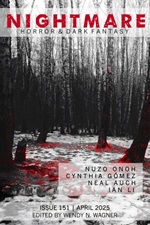“The Witch-Doctor’s Revenge” by Nuzo Onoh
“A Girl Goes on a Date Alone at Night” by Cynthia Gómez
“Glory Hole” by Neal Auch
Reviewed by Victoria Silverwolf
“The Witch-Doctor’s Revenge” by Nuzo Onoh takes place in Nigeria when it was a British colony. Although the narrator is African, he accepts the language, religion, and culture of the colonists. He goes to a remote village to serve as schoolmaster. Terrifying events occur, associated with the grave of the local witch-doctor. The climax involves a mysterious little girl who befriends the narrator.
Narrated in traditional style, this is a rather old-fashioned tale of terror, featuring reanimated corpses and other familiar tropes. Vivid descriptions of ghastly occurrences make it seem like a gory horror movie featuring plenty of special effects. What happens to the narrator raises questions about the nature of religious faith and traditional culture.
“A Girl Goes on a Date Alone at Night” by Cynthia Gómez deals with a supernatural entity that takes the form of a woman. She destroys men who attempt to sexually assault her.
There is little more to this brief tale than the premise and detailed accounts of the various fates suffered by the men, each one offering a kind of ironic poetic justice. A note at the end reveals that the author was inspired by other works dealing with revenge against sexual violence. This offers proof that the work is not entirely original, even if it is an effective example of the theme.
The narrator of “Glory Hole” by Neal Auch accepts the opportunity to have sex with several anonymous men, voluntarily playing the part of a submissive servant to a dominant master. Flashbacks reveal minor transgressions on the narrator’s part, as the situation changes from erotic to supernaturally gruesome.
Readers should be aware that this is an extremely sexually explicit story, which I have tried to describe in as discreet a way as possible. The narrator’s welcoming of the experience may be intended as an account of the psychology of masochism. In any case, the narrator’s trivial acts of rebellion (such as stealing a candy bar when a child) are far out of proportion compared to what happens.
Victoria Silverwolf never stole a candy bar.
 Nightmare
Nightmare